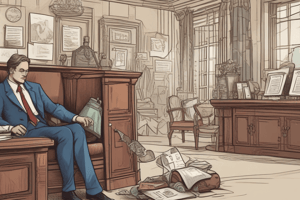Podcast
Questions and Answers
What does Justified True Belief (JTB) require for a belief to qualify as knowledge?
What does Justified True Belief (JTB) require for a belief to qualify as knowledge?
- The belief must be true, justified, and accepted by society.
- The belief must be true, justified, and based on empirical evidence.
- The belief must be justified, true, and infallible.
- The belief must be justified, true, and held by an individual. (correct)
What is an example of a scenario that illustrates a challenge to JTB?
What is an example of a scenario that illustrates a challenge to JTB?
- A stopped clock showing the correct time. (correct)
- Someone recalling a vivid dream as reality.
- A person winning a lottery after studying statistics.
- A shipowner believing their ship is seaworthy due to anecdotal evidence.
What distinguishes strong foundationalism from weak foundationalism?
What distinguishes strong foundationalism from weak foundationalism?
- Strong foundationalism asserts basic beliefs are infallible. (correct)
- Strong foundationalism believes basic beliefs need further justification.
- Weak foundationalism claims basic beliefs are unreliable.
- Weak foundationalism supports the idea of self-justifying beliefs.
According to Clifford's Ethics of Belief, what is the moral duty regarding beliefs?
According to Clifford's Ethics of Belief, what is the moral duty regarding beliefs?
What type of skepticism suggests that we may be living in a scenario like the Matrix?
What type of skepticism suggests that we may be living in a scenario like the Matrix?
What implication does contextualism suggest about knowledge claims?
What implication does contextualism suggest about knowledge claims?
What is likely the problem with beliefs that are justified and true yet do not amount to knowledge as illustrated by Gettier cases?
What is likely the problem with beliefs that are justified and true yet do not amount to knowledge as illustrated by Gettier cases?
What distinguishes knowledge from mere true belief in practical terms?
What distinguishes knowledge from mere true belief in practical terms?
What does the term 'phenomenal consciousness' refer to?
What does the term 'phenomenal consciousness' refer to?
What does the 'Mary Argument' illustrate about consciousness?
What does the 'Mary Argument' illustrate about consciousness?
Which type of experience is defined as perceptions that accurately reflect reality?
Which type of experience is defined as perceptions that accurately reflect reality?
What does 'indirect realism' suggest about perception?
What does 'indirect realism' suggest about perception?
The argument from illusions and hallucinations supports which philosophical view?
The argument from illusions and hallucinations supports which philosophical view?
What does disjunctivism claim about veridical and non-veridical experiences?
What does disjunctivism claim about veridical and non-veridical experiences?
What does the transparency view challenge regarding direct realism?
What does the transparency view challenge regarding direct realism?
What aspect of physicalism do reductionist theories advocate for?
What aspect of physicalism do reductionist theories advocate for?
Flashcards are hidden until you start studying
Study Notes
Justified True Belief (JTB)
- Definition: A traditional view of knowledge that states knowledge requires a belief that is true and justified.
- Example: A clock showing the correct time twice a day. A person looking at it at that time believes it's the correct time but isn’t.
Gettier Cases
- Purpose: Challenge the JTB theory by providing examples of situations where beliefs are justified and true but do not constitute knowledge.
- Impact: Demonstrate that justified true beliefs could still fail to amount to knowledge due to luck or external factors.
Foundationalism
- Basic Beliefs: Self-justifying beliefs that don't require further justification.
- Non-Basic Beliefs: Require a chain of justification, building upon basic beliefs.
- Strong Foundationalism: Asserts that basic beliefs are infallible.
- Weak Foundationalism: Accepts that basic beliefs may not always be infallible, but are still more reliable than derived beliefs.
The Value of Knowledge and Justification
- Instrumental Value: True beliefs are valuable for practical applications.
- Non-Instrumental Value: Knowledge is considered more stable and reliable, providing a foundation for further beliefs and actions.
- Clifford's Ethics of Belief: Emphasizes the moral duty to ensure beliefs are well-founded.
Skepticism
- Skeptical Hypotheses: Scenarios like The Matrix or an evil demon deceiving us about the world.
- Implications: We might not be able to know much about the world due to the possibility of deception.
Contextualism
- Context-Dependence: Suggests that knowledge claims depend on the context, with epistemic standards varying by situation.
- Everyday Scenarios: Potentially dissolves skeptical arguments by allowing lower standards in routine contexts.
Phenomenal Consciousness
- Subjective Experience: The "what it is like" aspect of consciousness, focusing on qualitative experiences.
- Hard Problem: Explaining how subjective experiences arise from physical processes.
Physicalism and Dualism
- Physicalism: Asserts consciousness can be fully explained by physical states.
- Reductionist Theories: Suggest consciousness can be reduced to physical properties.
- Non-reductionist Theories: Claim that physical explanations are insufficient to understand consciousness.
- Dualism: Proposes that consciousness involves separate, non-physical properties.
Mary Argument
- Scenario: A scientist, Mary, who knows everything physical about color but has never experienced it.
- Implication: Upon seeing color, she gains new knowledge, suggesting there are non-physical aspects to experience.
Perception
- Veridical Experiences: Accurate perceptions that reflect reality.
- Illusory Experiences: Misleading perceptions that distort reality.
- Hallucinatory Experiences: Perceptions without external stimuli.
Direct vs. Indirect Realism
- Direct Realism: Perception connects us directly to objects without mental intermediaries.
- Indirect Realism: Perception is mediated by mental representations or intermediaries.
Argument from Illusions and Hallucinations
- Premise: Illusions and hallucinations are often indistinguishable from veridical perceptions.
- Implication: Supports indirect realism, questioning whether perception always directly links us to the external world.
Disjunctivism
- Contrarian View: Argues that veridical and non-veridical experiences are fundamentally different, challenging indirect realism.
Transparency of Experience
- Concept: Our awareness in perceptual experience is directed outwardly, focusing on external objects.
- Challenge to Direct Realism: Suggests perception might inherently involve a direct connection with the world, supporting the direct realist perspective.
Studying That Suits You
Use AI to generate personalized quizzes and flashcards to suit your learning preferences.




